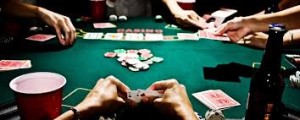 Early this morning I was walking back from a poker game with a friend of mine, and in discussing the various memorable hands I was reminded of how the frailties of human cognition can cause us to regret decisions that should not be regretted and to revisit our basic “rules of life” when it fact we should keep calm and carry on.
Early this morning I was walking back from a poker game with a friend of mine, and in discussing the various memorable hands I was reminded of how the frailties of human cognition can cause us to regret decisions that should not be regretted and to revisit our basic “rules of life” when it fact we should keep calm and carry on.
There were 9 players at the table and the game was Texas hold ’em. My hole cards were rags: 4 of clubs and a 3 of diamonds. Several of the players in front of me made large bets, including one chap who almost never bluffs (i.e., when he bets big, he has good cards). My decision rule for these situations is to fold, and that’s what I did.
The flop then came up with two 4s and a 3, meaning I would have been handed a full house if I had stayed in. The pot ended up being large because multiple players had strong hands, but not enough to beat the full house. By folding, I missed out on a huge pot.
The common tendency in this situation is to kick oneself: How could I have been so stupid? In light of full information, I see that my decision rule had a lousy outcome. The trick in these moments, when a vivid, easily recalled example of a bad outcome can fool you into overestimating how representative it is, is to look back at the base rates of the consequences of your decision rule. When I did that, I realized that over the course of the game I had been in this same situation a half dozen times and in every other case, if I had stayed in, I would have been crushed. There was in short nothing wrong with my general decision rule to fold when I have terrible hole cards and multiple players in front of me have made big bets.
To move from this trivial experience to a more consequential example of the same principle, let me relate a story about a treasured mentor who got absolutely conned by a selfish and dishonest academic. The con artist managed to get an enormous amount of scut work dumped on my mentor yet also persuaded everyone in the upper ranks of the university that he had done it all himself, which lead to an award for the con artist and not my mentor.
My mentor was utterly unperturbed and his explanation stayed with me. “I trust people. It’s how I operate. As a result, once every decade or so I get totally taken in by a sociopath like him. I accept that cost because the rest of the time, trusting people makes me a happier and better human being, which is worth much more.”
Reminiscent of Trivers' evolutionary parable about the hawks and doves within a species. In a conflict over food or mating, hawks fight, doves run away. In a conflict between a hawk and a dove, the hawk wins. In a conflict between two hawks, both get damaged. (I've forgotten what happens in a conflict between doves; maybe they toss for it.) Their behaviour is ex hypothesi strictly programmed genetically. What happens to the gene frequencies?
Suppose we start with a population of doves. A mutation for hawkishness is initially terrific, as the hawks get the resources every time. This fits our pessimistic Hobbesian intuitions. It looks as if the hawks (Cains) will wipe out the doves (Abels). Not so. Suppose we start with all hawks. They are constantly fighting each other and getting damaged. Introduce a mutation for dovishness. The lone dove runs away in every meeting with a hawk, and lives to scrounge another day. (This even works for mating, in some social species.) So the gene for dovishness spreads. In equilibrium, you get both genes and both behaviours. The proportion depends on the numbers in the payoff matrix.
The parable provides a good frame for thinking about the persistence in humans of both virtue and vice, aggression and pacifism. We are probably genetically enabled for both pairs. See also the plotlines of The Seven Samurai and its remake The Magnificent Seven.
See also the plotlines of The Seven Samurai
The PERFECT reference point, indeed much of Kurosawa's work is one this theme.
The brutal, not the meek, will inherit the earth. But they won't like it.
much, much better to be stolen from than to have to steal
Amen
Also, James Thurber: "The race is not always to the swift, nor the battle to the strong…but that's the way to bet".